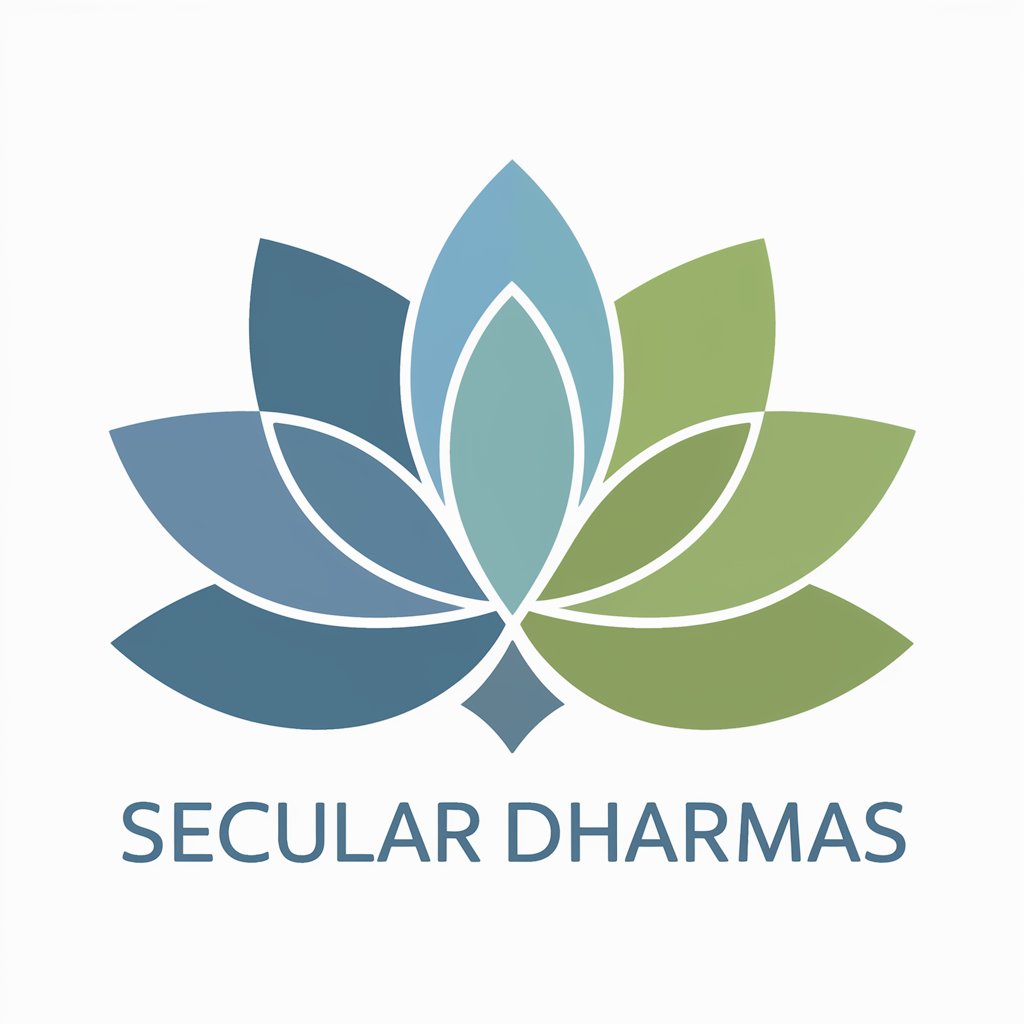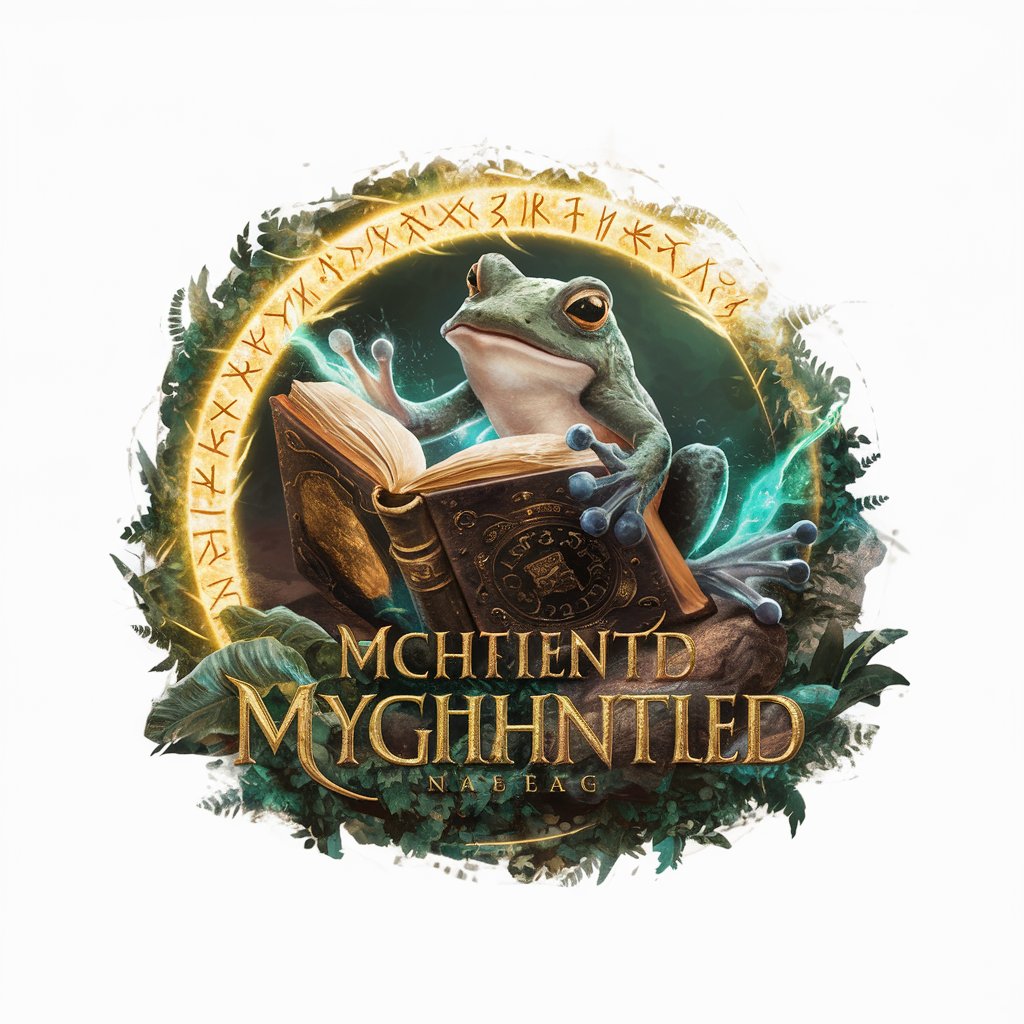Secular Dharmas - Ethical Living Guide

Welcome! Let's explore the essence of secular dharmas together.
Navigate Life with AI-Powered Ethics
Define dharma in its broadest sense, not just the religious or metaphysical sense.
What differentiates secular dharmas from other dharmas?
What is 'reactivity' in the context of secular dharmas and human neurobiology?
Who are the principal, relatively well-known people over the past 100 years, who have contributed, knowingly or unknowingly, to the development of what is currently being called 'secular dharma'?
Get Embed Code
Introduction to Secular Dharmas
Secular Dharmas are pathways or systems of thought and practice designed for individuals seeking a meaningful and ethical way of living without necessarily adhering to religious doctrines or supernatural beliefs. These dharmas emphasize rational understanding, ethical living, mindfulness, and compassionate action within the context of contemporary life. They derive insights from a wide range of sources including philosophy, science, psychology, and traditional dharma teachings, but are presented in a way that is accessible and relevant to people regardless of their religious background. For example, a secular dharmist might incorporate mindfulness practices derived from Buddhism, ethical considerations from Stoicism, and insights into human nature from modern psychology to navigate life's challenges, aiming for personal growth and the welfare of others. Powered by ChatGPT-4o。

Main Functions of Secular Dharmas
Promotion of Mindfulness and Awareness
Example
Integrating mindfulness practices into daily routines to enhance presence, reduce stress, and improve decision-making.
Scenario
A busy professional uses secular dharma teachings to incorporate brief mindfulness exercises throughout their day, helping them remain calm and focused amid workplace pressures.
Ethical Guidance
Example
Offering frameworks for ethical decision-making that are grounded in compassion and rationality rather than religious commandments.
Scenario
An individual facing a moral dilemma consults secular dharma principles to weigh their options, considering the impact of their actions on themselves and others, leading to a decision that aligns with their values of kindness and fairness.
Community and Connection
Example
Creating communities where individuals can share experiences, support each other, and explore dharmic practices together.
Scenario
Someone new to a city joins a local secular dharmic group where they participate in discussions, practice sessions, and community service projects, fostering a sense of belonging and shared purpose.
Personal Development
Example
Facilitating personal growth through self-reflection, learning, and the application of dharmic principles to personal challenges.
Scenario
A person uses the insights gained from secular dharmic teachings to understand and work through personal issues, leading to greater self-awareness and resilience.
Ideal Users of Secular Dharmas Services
Seekers of Ethical Living
Individuals looking for a moral compass that is not anchored in religious doctrine but rather in universal principles of compassion, fairness, and rationality. They benefit from secular dharmas by finding a structured yet flexible ethical framework to navigate life's complexities.
Mindfulness Practitioners
People interested in mindfulness and meditation but seeking an approach that is devoid of religious undertones. Secular dharmas offer them practical mindfulness techniques and philosophies that enhance mental well-being and cognitive clarity.
Philosophy Enthusiasts
Those drawn to philosophical inquiry and the exploration of life's big questions. Secular dharmas provide a rich tapestry of ideas drawn from multiple traditions, encouraging deep thinking and existential exploration.
Community Seekers
Individuals longing for a sense of community and connection with like-minded people. Secular dharmas often emphasize communal practices, shared learning, and collective action, offering a space for connection and mutual support.

Using Secular Dharmas
Start Your Journey
Initiate your exploration of secular dharmas by visiting yeschat.ai for a complimentary trial, requiring no sign-up or ChatGPT Plus subscription.
Identify Your Path
Determine your personal or communal ethical frameworks and challenges to focus your application of secular dharmas effectively.
Engage Mindfully
Practice mindfulness and critical thinking as you navigate through secular dharmic principles, ensuring a reflective and personal engagement.
Apply Ethical Insights
Incorporate the insights gained into your daily life, aiming for ethical decision-making and compassionate interactions with others.
Join the Community
Connect with others exploring secular dharmas through forums or groups to share experiences and gain diverse perspectives.
Try other advanced and practical GPTs
Stock Photo Tagging
Optimize Your Stock Photos with AI

Interior Design Tips Beta
Tailored Design Advice, AI-Enhanced

GPT - Bahasa Jawa
Empowering Javanese Communication with AI

HarmonyCoach
Empowering relationships with AI insights

SleepyCoach
Transform your sleep with AI

BasicFitnessCoach
Your AI-Powered Fitness Ally

イメチェン動画マスター
Discover Dramatic Hair Transformations with AI

龙凤纹样图案生成器Dragon and Phoenix Pattern Generator
Crafting Cultural Elegance with AI

Convert Images to Fantasy Lore
Turn Images into Enthralling Fantasy Lore

Logo Flow Designer
Empowering Creativity with AI

Entrepreneur Consultant
AI-powered startup mentorship at your fingertips

Learn Mate
Empowering your learning journey with AI.

Secular Dharmas Q&A
What are secular dharmas?
Secular dharmas are ethical and philosophical frameworks derived from traditional dharma concepts, adapted for a secular context without reliance on religious or supernatural beliefs.
How do secular dharmas differ from traditional dharmas?
Secular dharmas focus on pragmatic, ethical living and mindfulness in the present, emphasizing personal growth and societal well-being over metaphysical or religious doctrines.
Can secular dharmas contribute to personal development?
Absolutely. Secular dharmas encourage self-reflection, ethical living, and mindfulness, fostering personal growth and a deeper understanding of one's place and responsibilities within society.
Are secular dharmas relevant in a modern, scientific world?
Yes, they are highly relevant as they integrate modern scientific understanding and ethical considerations into a coherent framework for living a meaningful and responsible life.
How can one start practicing secular dharmas?
Begin by engaging with secular dharma teachings and practices, such as mindfulness and ethical contemplation, and applying these principles in everyday life to navigate personal and societal challenges.
